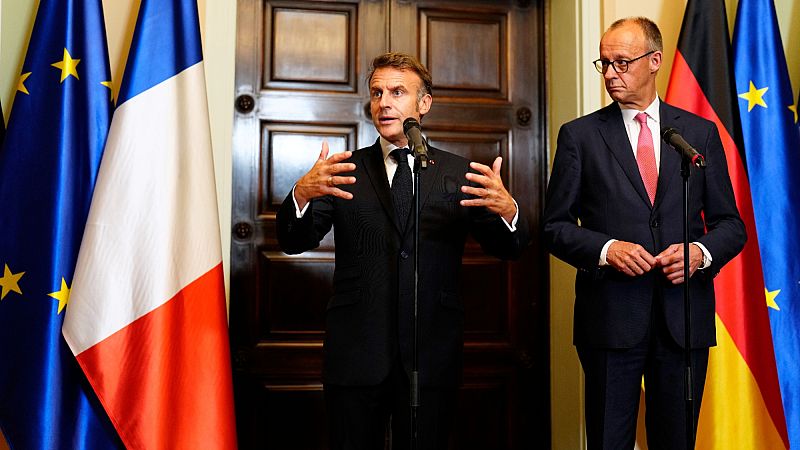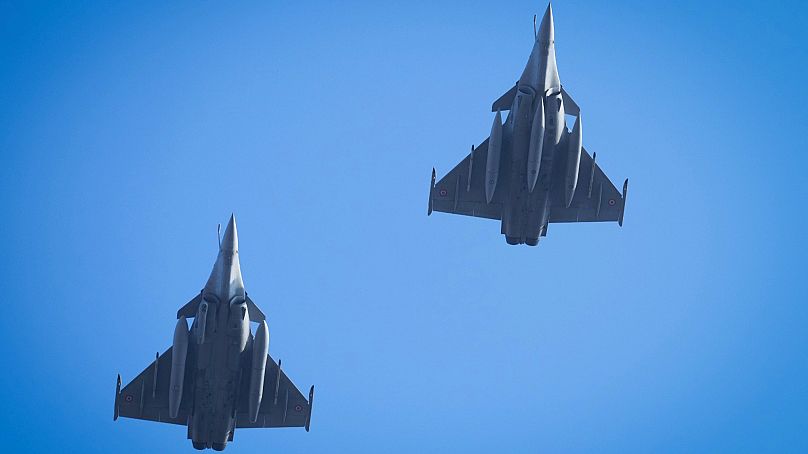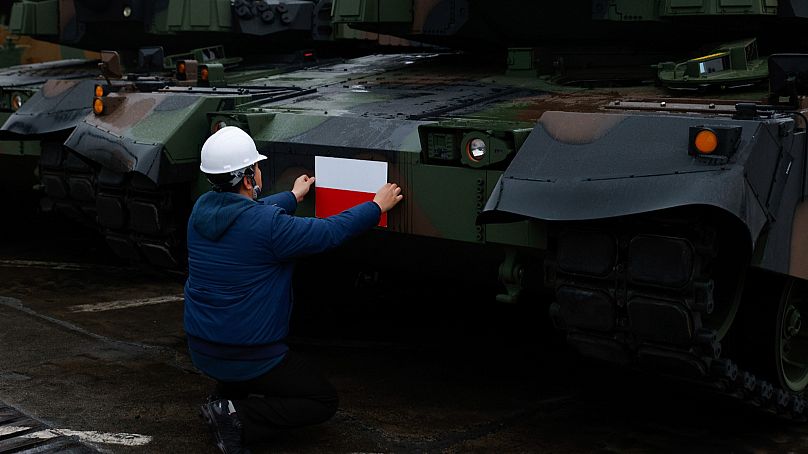Defence: France and Germany looking at 'best athlete' model to boost European military production

Should EU member states racing to rearm favour so-called European "best athletes" in weapons production to the potential detriment of many other homegrown companies?
France and Germany are starting to think so with Emmanuel Macron and Friedrich Merz set to kickstart discussions on the controversial proposal on Friday.
The two leaders and their respective foreign and defence ministers are set to discuss joint defence projects, whether France's nuclear deterrent should be extended to the rest of the 27-country bloc, and how to bolster Europe's defence industrial and technological base at the Franco-German Council on Security and Defence.
It's on the latter point that the French President and the German Chancellor will start talks on whether the bloc can achieve a "best athlete" system, the Elysee said earlier this week.
"The logic of the best athlete is to try to reduce the number of weapons systems in Europe," officials from the French presidential palace added.
Rafale, F-35 and Gripen
The EU's efforts to ramp up defence production over fears Russia could attack before the end of the decade have been hindered by the sector's high level of fragmentation as many member states have historically favoured their own domestic defence industries on national security grounds.
This has also been an issue for Ukraine which has had to learn to use and service the various weapons systems donated by European countries as it fights off Russia's full-scale invasion.
For instance, at least four different types of fighter jets are used across Europe including the European-made Eurofighter Typhoon, the Rafale, the JAS Gripen as well as the American-made F-35. When it comes to tanks, Germany's Leopard, France's Leclerc, Britain's Challenger, Italy's Ariete, the US Abrams, and South Korea's K2 are all being used across the continent.
With hundreds of billions of euros set to pour into the sector by 2030, various initiatives are now under way to pool procurements with the stated aims to not only reduce costs and boost interoperability, but also fire up European manufacturing lines.
Macron's insistence on a so-called European preference for defence procurement over the past year already ruffled feathers among his fellow EU leaders with some fearful of possible retaliation from the US, and others arguing the move would primarily favour the French defence sector.
A "best athlete" system is bound to raise hackles and similar criticisms too.
'A sensible decision'?
For Ester Sabatino, a research associate for Defence and Military Analysis at the International Institute for Strategic Studies (IISS), following a "best athlete" model could be "a sensible decision" as these companies are "presumably, better placed to satisfy demand thanks to fast and proven development and production cycles".
But while it might lead to fewer models of military equipment, it would not necessarily lead to a reduced number of national variants of the same equipment and therefore of types of logistical support needed per equipment, Sabatino also said.
Additionally, it could result in fewer industrial alternatives and lower competition, which could slow down innovation.
"Security of supply considerations would also make it complex to accept the model from countries that do not have such athletes. In the case of European capitals, such as Warsaw, that are investing in the further development of their national defence industrial base there may be a strong resistance to the model as it could preclude the accomplishment of their own national ambitions," Sabatino said.
Poland buys a lot of its big-ticket military equipment in the US and South Korea. It announced earlier this month that it will buy an additional 180 tanks from the Asian country in a deal worth over €6 billion.
'Extremely complex work'
It is unclear yet if the approach France and Germany will lean towards will include more pan-European initiatives and model the likes of the Eurofighter or MBDA which produces missiles and related systems and is the result of a merger between French, British and Italian companies.
Macron and Merz are set to discuss joint defence projects at their meeting on Friday including the Future Combat Air System (FCAS), a fighter jet, and the Main Ground Combat System (MGCS), a battle tank.
But the FCAS is at the centre of a dispute following the demand by France's Dassault that it gets 80% of the workshare.
"FCAS is in a very peculiar situation at the moment, since parts of the industrial base and interest groups in both countries want the project to fail, to carry on the projects in a national/alternative framework," Jacob Ross, a research fellow at the German Council on Foreign Relations, told Euronews.
"There is a lot of pressure on Merz, Macron and their respective defence ministers to come forward with a solution to the ongoing conflict on FCAS. If the project fails to go forward, it would be a fatal signal for Franco-German leadership in Europe in terms of defence industrial cooperation," he added.
Therefore, for the two countries to successfully lobby other EU member states on a "best athlete" model going forward, they would need a consolidated joint position both at the political and industrial levels, both experts told Euronews.
"That is not the case at the moment," Ross said, notably because their respective industries are too different and Germany's default remains to buy American for equipment it does not produce at home.
The Elysee has already sought to manage expectations, stressing that developing such a policy "will require extremely complex work".
"Ultimately, the question is how Europeans can reduce the number of weapons systems they have, use the same ones, produce them in Europe, and do so in a way that ensures both their sovereignty and the robustness of their production capacity. This is not easy," it added.
Today



